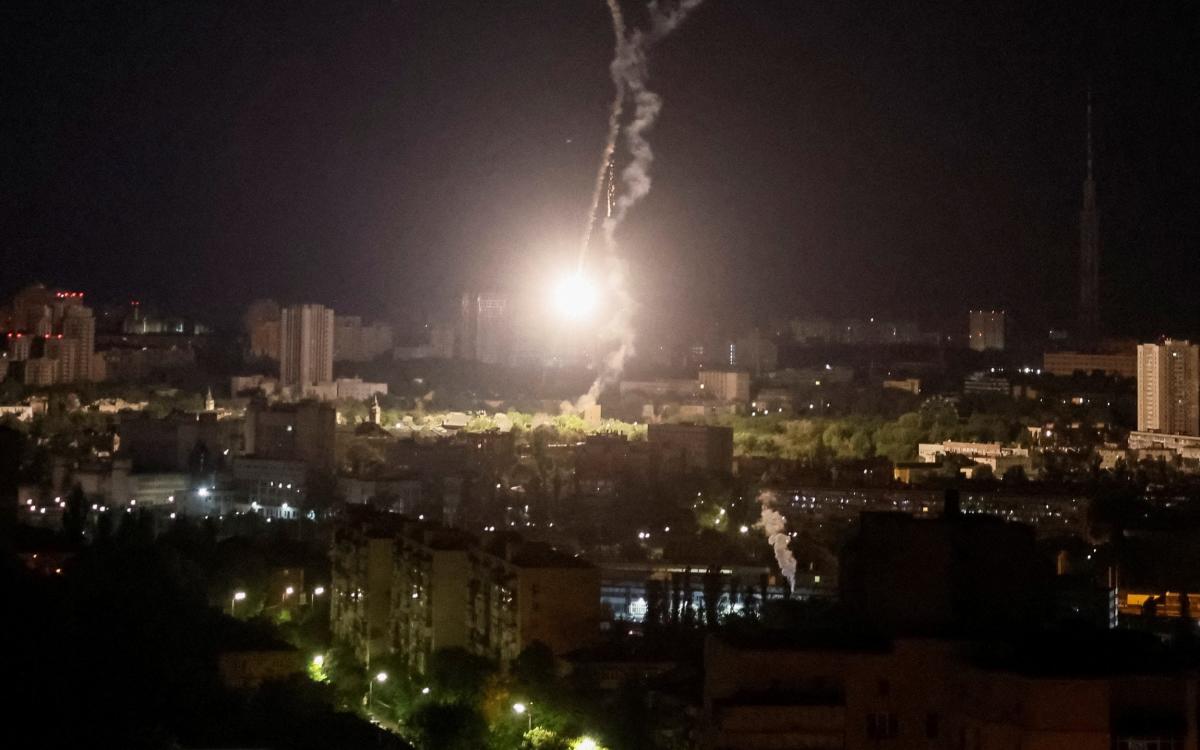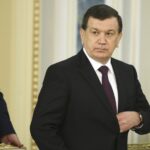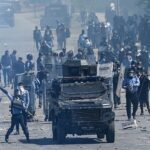Global Courant 2023-05-18 11:00:00
Explosion of a missile is seen in the skies above the city during a Russian missile strike, amid the Russian attack on Ukraine, in Kiev, Ukraine, May 16, 2023
I was in Kiev on Monday night when the capital of Ukraine was hit largest missile strike since the beginning of the war.
It was more than just another attempt to terrorize the city. Following President Zelensky’s visit to Europe with renewed guarantees of military aidit amounted to a demonstration of violence by an increasingly beleaguered Russian dictator.
Within half an hour the city was attacked from the north, south and east. Ballistic missiles came in, Iranian Shahed drones loitering, Kalibr hypersonic cruise missiles launched from warships in the Black Sea, and Kinzhal hypersonic missiles fired from MiG-31K fighters.
The result of this enormous firepower was nothing short of a bitter humiliation for Putin.
I watched as Ukraine’s combined air defense forces, including American Patriots and German Gepards, seemingly knocked out every Russian missile. Only three people were injured by falling missile debris, there was minimal physical damage, and by daylight the city had returned to normal as if nothing had happened.
This event symbolizes both Ukrainian resilience and Russian weakness. Especially the last.
After being surprised by the unexpected failure of his first invasion last February, Putin came up with a hasty Plan B. Wunderwaffe (“wonder weapons”), in much the same way as Hitler did in the second half of World War II, as he built up his troops for a renewed offensive this spring.
That much-vaunted attack fell through, as the Russian army has so far barely been able to advance a few miles in one or two places – at the cost of massive casualties. I spoke to a Ukrainian field commander today, fresh from the fighting Bakhmutwho told me that after the war Ukraine needed to build a monument to Russian military corruption, to which he attributes an inability to build and equip enough troops or to learn from repeated tactical and strategic blunders.
Story continues
The failure of the second pillar of Putin’s plan – his miracle weapons – is perhaps even more damaging. When he first unveiled the Kinzhals in 2018, he claimed they could penetrate all existing and future missile defense systems. Just before the invasion of Ukraine, he boasted that Russia was the world leader in hypersonic missiles and had probably developed technology to counter these new weapons by the time other countries had caught up.
The harsh reality underscored in the latest apparent downing of all six Kinzhals fired at Kiev has raised questions about Russia’s ability to wield military power, including its nuclear arsenal, which has been the key factor in deterring total Western support for Ukraine.
The reluctance of the US and Europe to donate some of the much-needed weapons for fear of escalation is being steadily overcome as Russia’s impotence becomes increasingly apparent. The UK’s recent supply of Storm Shadow long-range missiles and British and French decisions this week to train Ukrainian pilots and work with other countries to deliver F-16s are the latest indications of a growing determination.
But it would be reckless to take all this as an indication that a future Ukrainian victory is guaranteed. Kiev is still in a desperate fight for its life and there is no sign that Russia is likely to give up. It is far from clear that the Ukrainian army has sufficient resources to mount the decisive counter-offensive, which has long been said to be imminent.
Field commanders I spoke to this week, while unfailingly grateful for what has been delivered so far, all emphasized the urgent need for more tanks, fighter jets, ammunition, missiles, artillery shells and drones. Despite more than a year of war, morale remains high among the Ukrainian armed forces. Their bravery and fighting prowess are beyond question. But in the end, they can only prevail if the West continues to increase its military aid.
Putin’s latest disaster over Kiev may well contribute to that.
Colonel Richard Kemp is a former infantry commander








